A Very Inhuman New Year To You All!
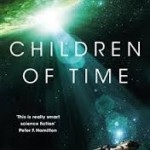 So I feel I've been putting in the hours on my inhuman characters, what with the protagonists of Children of Time and this year's release of Spiderlight from Tor UK, as well as more human examples like the insect-kinden, or the shapeshifters of The Tiger and the Wolf. I first got into SF for the aliens. When I was a kid I would inch through the frames of the Cantina scene in Star Wars to admire all the critters (many of which were basically halloween masks, of course). I loved the alien bounty hunters in Empire and Cayman of the Lambda Zone in Battle Beyond the Stars (1). As can be seen from my obsession with bugs and the like, I have always identified with the outsider. When I became a writer, a kind of holy grail occurred to me: the ultimate outsider as protagonist — a point of view that was genuinely detached from the human, and yet which human readers (2) would relate to. I'm not sure it's possible — those are two opposing magnet poles we're talking about. I would flatter myself that I've come close with Children of Time. Certainly the reaction people have had to Portia and her kin was what I hoped for — the characters coming over as both sympathetic and inhuman at once. However they are bad examples. They are creatures of our earth, further humanised by simian meddling. The holy grail continues to elude.
So I feel I've been putting in the hours on my inhuman characters, what with the protagonists of Children of Time and this year's release of Spiderlight from Tor UK, as well as more human examples like the insect-kinden, or the shapeshifters of The Tiger and the Wolf. I first got into SF for the aliens. When I was a kid I would inch through the frames of the Cantina scene in Star Wars to admire all the critters (many of which were basically halloween masks, of course). I loved the alien bounty hunters in Empire and Cayman of the Lambda Zone in Battle Beyond the Stars (1). As can be seen from my obsession with bugs and the like, I have always identified with the outsider. When I became a writer, a kind of holy grail occurred to me: the ultimate outsider as protagonist — a point of view that was genuinely detached from the human, and yet which human readers (2) would relate to. I'm not sure it's possible — those are two opposing magnet poles we're talking about. I would flatter myself that I've come close with Children of Time. Certainly the reaction people have had to Portia and her kin was what I hoped for — the characters coming over as both sympathetic and inhuman at once. However they are bad examples. They are creatures of our earth, further humanised by simian meddling. The holy grail continues to elude.
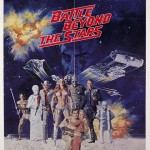 Why bother trying to write from the point of view of something your audience may have a tough time relating to? Because it teaches us about ourselves (which is a good answer to pretty much any 'Why fantasy?' or 'Why SF?' kind of question. But also because exploring the other is a valid goal in itself. Especially now. We are perilously close to meeting the Other in real life — in a form we ourselves create. Serious non-SF people are debating what laws should bind artificial intelligences even now, and what rights they will have. I've been on and watched relevant panels at most conventions this year and the topic has shifted from "writing non-human characters" to "non-humans in real life". (At Fantasycon, I think it was, I had a serious moment of laconic nihilism. Someone asked "How do you think people will handle granting rights to AIs?" they asked. "Badly," was my reply. But on that subject, I'd argue that all that SF from RUR up has been based very solidly on human nature.
Why bother trying to write from the point of view of something your audience may have a tough time relating to? Because it teaches us about ourselves (which is a good answer to pretty much any 'Why fantasy?' or 'Why SF?' kind of question. But also because exploring the other is a valid goal in itself. Especially now. We are perilously close to meeting the Other in real life — in a form we ourselves create. Serious non-SF people are debating what laws should bind artificial intelligences even now, and what rights they will have. I've been on and watched relevant panels at most conventions this year and the topic has shifted from "writing non-human characters" to "non-humans in real life". (At Fantasycon, I think it was, I had a serious moment of laconic nihilism. Someone asked "How do you think people will handle granting rights to AIs?" they asked. "Badly," was my reply. But on that subject, I'd argue that all that SF from RUR up has been based very solidly on human nature.
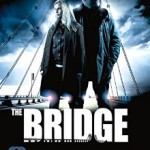 Before engaging the hyperdrive and shooting off into SF, let's talk about The Bridge. This is a Danish-Swedish police show which is exceptionally good, whilst also being rather grim and dour. One of the reasons it is so intensely engaging is the character of Saga Noren (portrayed by Sofia Helin). Saga is one of Sweden's top detectives. She is also on the autistic spectrum: she has great difficulty with social niceties, appropriate conversation and relationships with others, whilst having an incredible eye for detail backed by incomparable drive and determination. But Saga is not the "splinter skill" idiot savant we often see in those situations. She is s a complex character, at once an outsider and the absolute backbone of the Malmo PD. While she presents Saga as relatively affectless, Helin still puts over the character's deep emotional life. (3)
Before engaging the hyperdrive and shooting off into SF, let's talk about The Bridge. This is a Danish-Swedish police show which is exceptionally good, whilst also being rather grim and dour. One of the reasons it is so intensely engaging is the character of Saga Noren (portrayed by Sofia Helin). Saga is one of Sweden's top detectives. She is also on the autistic spectrum: she has great difficulty with social niceties, appropriate conversation and relationships with others, whilst having an incredible eye for detail backed by incomparable drive and determination. But Saga is not the "splinter skill" idiot savant we often see in those situations. She is s a complex character, at once an outsider and the absolute backbone of the Malmo PD. While she presents Saga as relatively affectless, Helin still puts over the character's deep emotional life. (3)
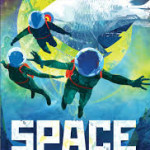 What struck me while watching the second series was that you could have set the show in the near future and made Saga an android, and a lot of the script would have worked as is (she is even called a "robot" in an argument with a colleague). Whether Saga's internalised emotional life would survive, though, is another matter. We often see artificial or inhuman life portrayed as being our intellectually equals (or superiors) in reasoning, but unable to cope with the intricacies of human emotions (Spock, anyone? Or any of those aliens who suddenly become sympathetic when they discover This Human Thing You Call Love). And this, of course, despite the likelihood that many of our emotions (biochemical reactions as they are) evolved before conscious rational thought. We see our rationality as an ideal and universal state that artificial and alien minds must inevitably converge on, while our emotional life is ours and ours alone, the thing that allows us to relate to each other and makes us human. And it is approaching that emotional life from their initial position of cold logic that redeems the alien or the mechanical, and grants them the Big Gold Star that is Being a Second Class Human.
What struck me while watching the second series was that you could have set the show in the near future and made Saga an android, and a lot of the script would have worked as is (she is even called a "robot" in an argument with a colleague). Whether Saga's internalised emotional life would survive, though, is another matter. We often see artificial or inhuman life portrayed as being our intellectually equals (or superiors) in reasoning, but unable to cope with the intricacies of human emotions (Spock, anyone? Or any of those aliens who suddenly become sympathetic when they discover This Human Thing You Call Love). And this, of course, despite the likelihood that many of our emotions (biochemical reactions as they are) evolved before conscious rational thought. We see our rationality as an ideal and universal state that artificial and alien minds must inevitably converge on, while our emotional life is ours and ours alone, the thing that allows us to relate to each other and makes us human. And it is approaching that emotional life from their initial position of cold logic that redeems the alien or the mechanical, and grants them the Big Gold Star that is Being a Second Class Human.
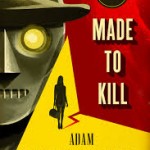 Going through the literature, though, there have been some recent books that are all about the inner emotional life of the inhuman, and which take emotion as a key building block, rather than the final icing on the cake of awareness. I recently finished Adam Christopher's Made To Kill, which is a superb noir detective story set in an alternative 60s where a wave of robot labour has come and then, after protests, gone, leaving a single robot detective stranded above the tide mark. The first person narrator of Made To Kill is a curious individual to get to know. He is as mentally and emotionally robust as he physically, but he is limited by his memory. Every day he needs to return to the office where his officiating computer Ada, another fascinating AI character, needs to put in a new tape. Hence, like Latro from Wolfe's Soldier in the Mists, he knows only what he is told about his past. And he repeatedly realises that Ada is not necessarily telling him everything, just as he isn't telling us everything. The result is a narrative constantly bounded by the artificial limitations of its narrator, who has a serious disability and has philosophically learned to live with it.
Going through the literature, though, there have been some recent books that are all about the inner emotional life of the inhuman, and which take emotion as a key building block, rather than the final icing on the cake of awareness. I recently finished Adam Christopher's Made To Kill, which is a superb noir detective story set in an alternative 60s where a wave of robot labour has come and then, after protests, gone, leaving a single robot detective stranded above the tide mark. The first person narrator of Made To Kill is a curious individual to get to know. He is as mentally and emotionally robust as he physically, but he is limited by his memory. Every day he needs to return to the office where his officiating computer Ada, another fascinating AI character, needs to put in a new tape. Hence, like Latro from Wolfe's Soldier in the Mists, he knows only what he is told about his past. And he repeatedly realises that Ada is not necessarily telling him everything, just as he isn't telling us everything. The result is a narrative constantly bounded by the artificial limitations of its narrator, who has a serious disability and has philosophically learned to live with it.
The subject is also touched on in Sophia MacDougall's Space Hostages (which I've praised before). One of the most alien things about the major alien race introduced therein is its attitute towards its own emotional life — which parts it overtly celebrates, which parts are culturally hidden away — a very different treatment to the typical malevolent alien invader trope.
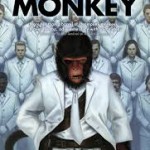 Gareth Powell is a writer who has shared the non-human character panels with me often enough that we practically have a double act going. His credentials come from the Ack-Ack Macaque books, which include both the titular uplifted monkey and another character who survives only as a kind of semi-AI recording of a human mind. Both characters are used to explore the key What-Am‑I? question. In Hive Monkey, Ack-Ack spends the book wrestling with the problem of being singular — a fully aware freak of science like nothing else in his world. Meanwhile the AI construct Paul is aware that he was never designed to last forever. As with Christopher's Ray, there is a curious pathos to being inhuman in a human world, whether it comes from within (and despite his belligerent nature, Powell's monkey has some deeply melancholy thoughts on the subject (4)) or from without. I'm going to throw Gene Wolfe in as well, because his writing has a large number of artificial characters who are presented as fully sentient, and often morally superior to their human counterparts. At the risk of spoilers, Jonas and Doctor Talos in Book of the New Sun, the Chems in the Long Sun books and even the artificial soldiers of the short story 'The HORARS of War' are very sympathetic inhuman characters, and all used to turn a glass on what it is to be human.
Gareth Powell is a writer who has shared the non-human character panels with me often enough that we practically have a double act going. His credentials come from the Ack-Ack Macaque books, which include both the titular uplifted monkey and another character who survives only as a kind of semi-AI recording of a human mind. Both characters are used to explore the key What-Am‑I? question. In Hive Monkey, Ack-Ack spends the book wrestling with the problem of being singular — a fully aware freak of science like nothing else in his world. Meanwhile the AI construct Paul is aware that he was never designed to last forever. As with Christopher's Ray, there is a curious pathos to being inhuman in a human world, whether it comes from within (and despite his belligerent nature, Powell's monkey has some deeply melancholy thoughts on the subject (4)) or from without. I'm going to throw Gene Wolfe in as well, because his writing has a large number of artificial characters who are presented as fully sentient, and often morally superior to their human counterparts. At the risk of spoilers, Jonas and Doctor Talos in Book of the New Sun, the Chems in the Long Sun books and even the artificial soldiers of the short story 'The HORARS of War' are very sympathetic inhuman characters, and all used to turn a glass on what it is to be human.
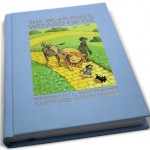 And what about L. Frank Baum? I don't think he intended The Wizard of Oz as a key transhumanist text, but having perused it recently, it's absolutely a valid reading. The Scarecrow is a spontaneous artificial mind, and the Tin Man is basically a benevolent Cyberman decades before they lumbered their way into Doctor Who. They start off very much defined by their unliving natures — and generally in a positive way because it allows them to overcome obstacles their living comrades cannot. However they also start internally limited by their awareness of their nature. The Scarecrow comes up with most of the ideas, yet feels the lack of a brain; the Tin Man cares deeply, yet believes the lack of a heart lessens him. The wizard solves their problems by chicanery, but that's fine because — and yes, it is a trite saying, but here it's relevant — the qualities were always inside them. They were held back only by their own belief in their second class nature. (5)
And what about L. Frank Baum? I don't think he intended The Wizard of Oz as a key transhumanist text, but having perused it recently, it's absolutely a valid reading. The Scarecrow is a spontaneous artificial mind, and the Tin Man is basically a benevolent Cyberman decades before they lumbered their way into Doctor Who. They start off very much defined by their unliving natures — and generally in a positive way because it allows them to overcome obstacles their living comrades cannot. However they also start internally limited by their awareness of their nature. The Scarecrow comes up with most of the ideas, yet feels the lack of a brain; the Tin Man cares deeply, yet believes the lack of a heart lessens him. The wizard solves their problems by chicanery, but that's fine because — and yes, it is a trite saying, but here it's relevant — the qualities were always inside them. They were held back only by their own belief in their second class nature. (5)
 And then we have the Imperial Radch series from Ann Leckie, which starts with the omni-award-winning Ancillary Justice and goes from strength to strength. I've written about Justice before, and the second book, Sword, is good, and Ancillary Mercy is exceptional. The entire series concerns the life of an AI, shoehorned into a single human body having previously been a huge warship and the hundreds of slaved soldiers that served aboard it. The protagonist of the series is a mind at once very alien and very human. She is used to splitting her attention between multiple locations and it's one of Leckie's gifts that this comes out clear as crystal and complements the internal life of the narrator at every turn. Far from being calculating war machines, the ships of the Imperial Radch are fiercely emotionally attached to their captains and crew, and indeed the great-heartedness of the Justice of Toren is a quality that seems inhuman not in its artificiality but in its intensity. The ship is able not just to think about all those under its protection, but to care deeply in a way that makes many of the hum characters seem shallow, self-involved and greedy. And of course it does, because how can they match the depth and breadth of experience and understanding that a ship can have? And from there, of course, we're heading on a course that might eventually bring us round to the godlike Minds of Iain M Banks' Culture novels and an entire different level of the inhuman…
And then we have the Imperial Radch series from Ann Leckie, which starts with the omni-award-winning Ancillary Justice and goes from strength to strength. I've written about Justice before, and the second book, Sword, is good, and Ancillary Mercy is exceptional. The entire series concerns the life of an AI, shoehorned into a single human body having previously been a huge warship and the hundreds of slaved soldiers that served aboard it. The protagonist of the series is a mind at once very alien and very human. She is used to splitting her attention between multiple locations and it's one of Leckie's gifts that this comes out clear as crystal and complements the internal life of the narrator at every turn. Far from being calculating war machines, the ships of the Imperial Radch are fiercely emotionally attached to their captains and crew, and indeed the great-heartedness of the Justice of Toren is a quality that seems inhuman not in its artificiality but in its intensity. The ship is able not just to think about all those under its protection, but to care deeply in a way that makes many of the hum characters seem shallow, self-involved and greedy. And of course it does, because how can they match the depth and breadth of experience and understanding that a ship can have? And from there, of course, we're heading on a course that might eventually bring us round to the godlike Minds of Iain M Banks' Culture novels and an entire different level of the inhuman…
(1) Anyone else remember that? Magnificent Seven in space, Roger Corman directing, cast included Robert Vaughn and George Peppard, as well as wossname from the Waltons. A surprisingly satisfying post SW SF film. One of Corman's last and, imho, best films.
(2) Curse my too, too human readership! 🙂
(3) I can't stress enough how good this series is. It is Grim As Hell, so you need to be up for a lot of unhappy endings, but my God it is a powerful piece of drama.
(4) Which he exorcises by punching and shooting people.
(5) As a bonus, the book I re-read was the beautiful new edition illustrated by Evan Dahm, which you can find here. Dahm is the artist behind the webcomics Rice Boy, Order of Tales and the currently ongoing Vattu, and a supremely gifted creator of fantastic worlds.
 © 2008-2025 Pan Macmillan
© 2008-2025 Pan Macmillan
[…] same fashion as we often tell stories about ourselves. So, once again, Tchaikovsky throws down a challenge that I was able to accept and move on because the story was just that doggone […]